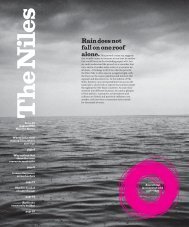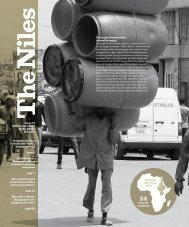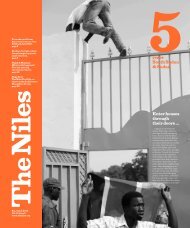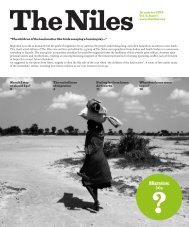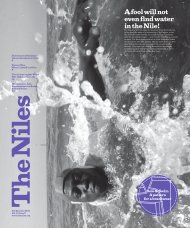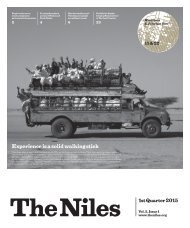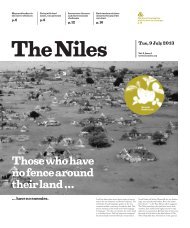When deeds speak, words are nothing
Speaking about sustainable development is easy. Acting sustainably is another matter. And now the evidence is unequivocal: Mankind’s impact on nature is causing the climate to change rapidly and drastically, threatening the environment and the very resources we need to survive. Aware that humanity is careening close to the edge, The Niles correspondents set out to explore where and how people in the Nile Basin region rethink. So much of their findings for now: We are an endlessly innovative species. Cooperation is our superpower. When deeds speak, words are nothing.
Speaking about sustainable development is easy. Acting sustainably is another matter. And now the evidence is unequivocal: Mankind’s impact on nature is causing the climate to change rapidly and drastically, threatening the environment and the very resources we need to survive. Aware that humanity is careening close to the edge, The Niles correspondents set out to explore where and how people in the Nile Basin region rethink. So much of their findings for now: We are an endlessly innovative species. Cooperation is our superpower. When deeds speak, words are nothing.
You also want an ePaper? Increase the reach of your titles
YUMPU automatically turns print PDFs into web optimized ePapers that Google loves.
Why Nile Basin wetlands
matter: providing multiple
and essential services for
people and nature in the
Nile Basin
Nile Basin
river
lake
seasonal wetland
permanent wetland
floodwaters to inundate. This capacity to
store and slow the flow of water during floods
can help to steady flow rates, reduce flood
peaks and lower the risk of flooding for towns
and important infrastructure.
The flooded nature of our wetlands also
allows many of them to accumulate peat, a
process taking place over thousands of years.
Wetlands that have been damaged by drainage,
overgrazing and other pressures emit carbon
and therefore contribute to climate change.
Restoring and properly managing wetlands
not only stops this emission of carbon,
but it also allows wetlands to capture and
store carbon, as well as absorb floodwaters
and therefore averting flooding that regularly
displaces people and destroys property.
Well-managed wetlands can therefore
play an important role in helping society adapt
to climate change.
But despite their potential contribution to
the fight to rein back climate change, wetlands
across the Nile Basin suffer from substantial
degradation, both due to human action and the
effects of climate change.
One crucial way of comprehending the
significant losses caused by this degradation is
to put a price tag on the ecosystem’s services.
Water supply and purification:
wetlands ensure freshwater
Wastewater is largely discharged into the
Wetlands without any form of treatment.
The abundant plant and microbe life in
wetlands retain, absorbs and breaks down
contaminants and assimilate into their
biomass, which helps clean water for
different uses like drinking, irrigation
and supporting aquatic lives.
Research and Education: Wetlands
provide valuable ecosystems for
out-door learning and research
Nile Basin wetlands offer field laboratories
for learning and doing research on
natural ecological processes, functions
and succession among others.
Climate Regulation: Wetlands provide
resilience against climate change
Nile Basin wetlands are sources of and
sinks for greenhouse gases. They help to
moderate local and regional temperatures,
precipitation, and regulate other
climatic elements and processes.
CO 2
CO 2
C
C
C
C
C
Rethinking the value of the Rweru-
Bugesera wetland
The Rweru-Bugesera wetlands complex is
a chain of lakes, marshlands and a river, and
their basins, at the headwaters of the Nile River.
“This wetland complex is shared between
Rwanda and Burundi,” explains Herman
Musahara, Associate Professor in the School
of Economics College of Business and Economics
at the University of Rwanda.
Rweru-Bugesera is one of the sub-basins
in Rwanda. It involves the lake Rweru, the lake
Cyohoha, Musahara explains, adding that its
water drains into the Nile after feeding water
into Akagera and Lake Victoria.
It is a relatively small wetland compared
to others. But, he says, many people use the
wetland, and it provides important ecosystem
services.
According to a 2020 Nile Basin Initiative
(NBI) technical report, entitled “Wetlands and
Biodiversity series Rweru-Bugesera Trans-
Habitat and Livelihoods:
Wetlands are critical for biodiversity
Wetlands are home to over 100,000 known
freshwater species globally. They are
essential for many amphibians, mammals,
reptiles and bird species. Wetlands also
provide important fibre, fuel and food
products like fish and support people
that earn their living directly from
fishing, aquaculture and tourism.
boundary Wetlands Complex (Rwanda-
Burundi)”, the total economic value of the
RweruMugesera wetland is estimated at
USD 124,098,826.
The cost of degradation is estimated above
USD 27.6 million, which is about 1.6 percent
of the GDP of the two countries. The failure
to rehabilitate and conserve wetlands that have
been degraded, experts say, will lead to their
inability to filter, store and supply freshwater
and may ultimately lead to a water crisis.
According to Musahara, robust regulatory
instruments are in place when it
comes to the Rweru-Bugesera wetlands
complex. However, he says, they are often
not used: “There is a gap, which is reflected
by the fact that implementing these policies
and strategies is not on average more than
35 percent”.
Given the significant human and economic
toll associated with degrading wetlands, urgent
action is required – and soon.
Flood and Drought Mitigation:
Wetlands are nature’s shock absorbers
During heavy rainfall, Nile Basin wetlands
reduce stream speed and act as natural
sponges that absorb water, which reduces
flooding and delays the onset of
droughts. Wetlands are a natural buffer
during extreme weather.
41









